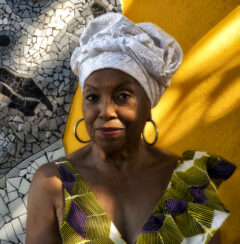
Marta Moreno Vega, PhD
Scholar, Lucumi Priestess, Founder, Creative Justice Initiative, Caribbean Cultural Center African Diaspora Institute, Co-Founder Corredor Afro
Foerster Lectures on the Immortality of the Soul
October 29, 2025 — 4:10 pmAlumni House, Toll Room — UC Berkeley Campus
About this lecture Those of us that carry the legacy, the history, the philosophical sacred thought that has as its origin the knowledge carried in the body of ethnic groups primary of West and Central Africa are the continuum of … Continued
Alumni House, Toll Room - UC Berkeley Campus Berkeley Graduate Lectures [email protected] false MM/DD/YYYYAbout this lecture
Those of us that carry the legacy, the history, the philosophical sacred thought that has as its origin the knowledge carried in the body of ethnic groups primary of West and Central Africa are the continuum of understanding the vibrancy of the ancestral soul’s whole energy manifests in our lives, of those of us actualized in what we understand as life.
It is relatively recent that many of us have felt comfortable, protected as scholars and intellectuals centering our living realities in the understanding of the sacred souls we reflect and honor in our remembrances. As an educator, African Diaspora cultural historian and institution creator, social justice, and racial equity activist I understood that academia generally regards scholarship from the “outside” looking in speaking from an “objective” voice as the most scholarly and authentic manner of presenting the esoteric information of spirit and our souls.
This presentation therefore will focus on both research woven with actual lived experiences of my family. As an African descendant a product of the continuum of knowledge brought to the Americas by enslaved ancestors from the 15th to 19th from West and Central Africa. Their fortitude in protecting their spiritual practices as systems of memory, knowledge and survival have survived in a multiplicity of locations including Cuba, Haiti, Brazil, Puerto and other Caribbean Islands and urban areas in the United States.
I share this information understanding that my grandmother as was our family unknowingly practicing as well as silencing practices that were historically culturally grounded in the legacy of the West African and Congo ethnic groups forged before BCE.
About Marta Moreno Vega
Dr. Moreno Vega has been an advocate for cultural equity, cultural studies, art as a tool for culture, social change and education. She started her career as an elementary school teacher in New York City. Since then, Dr. Moreno Vega has been invested in assuring that the contributions of African and African descendants are integral to the lives of civil society in the Americas.
Institution building has been one of Dr. Moreno Vega’s life’s purposes. She has established, founded, and cofounded institutions for more than 50 years. She became the Museo del Barrio second director in 1971, and then went on to establish the Caribbean Cultural Center African Diaspora Institute (CCCADI) in 1976, inspired by a vision to create an international organization to promote and link communities of African descent.
Through her lifetime, she was the founding director of Association of Hispanic Arts, founder of Network of Centers of Color and first director of the Roundtable of Institutions of Color as one of the founding board members. Moreno Vega has been consistently involved in uplifting Latino Arts and Culture and for that reason, she went on to be one of the founding board members of the National Association of Latino Arts and Culture and Global Afro-Latino Network Centers initiative co-founder.
Moreno Vega is also the co-founder of Global Afro-Latino and Caribbean Initiative (GALCI), a former program of Hunter College/Latin-American and Caribbean Studies. In 2017, Dr. Moreno Vega founded Creative Justice Initiative, and two years later, became the co-founder of Corredor Afro, along with Maricruz Rivera Clemente, Ph.D., longtime cultural worker, activist, and founder of Corporación Piñones Se Integra (C.O.P.I.). Recently seeing the need for collaboration within the Caribbean, she founded Afro-Global Network, a Caribbean based organization with a global perspective.